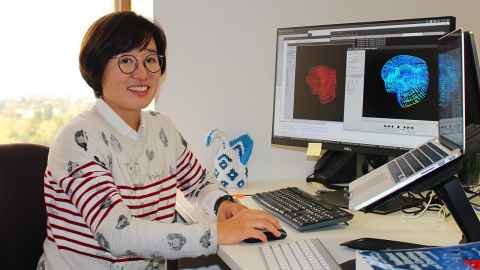An app, to quickly diagnose brain injury, including mild brain injury
8 May 2019
It should be possible, in the not-too-distant future, to use an app on your phone to diagnose whether a knock to the head could have long-term health consequences.

This is the aim of a collaborative project lead by Dr Vickie Shim at the Auckland Bioengineering Institute, which also involves bioengineers, neurosurgeons, neuroscientists, psychologists and MRI specialists.
Dr Shim has extensive experience in the computational modeling of the musculoskeletal system but “the brain is the last frontier in bioengineering research, because of the pure complexity of it”.
The diagnosis of mild, moderate or severe brain injuries is usually dependent on a questionnaire, but this is an imperfect way of diagnosing the effect of a brain injury says Dr Shim.
“It’s very subjective, and a lot of players don’t want to reveal the extent of an injury, because that might prevent them from playing.”
That lack of accurate diagnostics, biomarkers, and outcome measures of brain injury can have a devastating impact on a person’s life.
Her team aim to do a longitudinal study involving professional rugby players, who will wear thumbnail-size sensors that will measure the acceleration of sudden force to the head.
Using an MRI machine, they will track structural changes over time resulting from that impact. They will then use that information to create a high fidelity computational model of the brain and cell mechanical devices, how it has been damaged as a result of a mechanical insult, right down to the cellular level.
“Which will be the most accurate way to determine whether a certain head impact has the potential to lead to long-term damage,” says Dr Shim.
A lot of mild traumatic brain injuries don’t have any symptoms, she says.
Rugby players (and other people who’ve suffered a knock to the head) might feel fine after a few weeks, but may have incurred damage can have consequences that manifest much later in life, she says. “And that can lead to early onset Alzheimer’s disease and depression, and other health problems”.
She and her team are currently working with scientists who developed an eye-tracking method that can assess the impact of a brain injury through changes in eye movement.
Her team plans to use that method in an app, to quickly identify if an injury is mild, moderate or severe, quickly, easily and objectively.
As she notes, even a mild head injury should be taken seriously, although it often isn’t. “A lot of young players don’t realise the seriousness of head impact. They’ll brush it off and continue to play, but that can cause devastating outcomes in later stages of life.”
“Our app will tell you quickly, whether you should stop playing for a while, and if you should go and see a doctor.”
Like all research, how quickly they can develop the app will depend on getting funding, but if they do she’s confident she and her team will have developed an app that can identify a brain injury, and the level of severity, within a few years.
“Because we’ve got a good team, of people who are all leaders in their own field, including researchers from the CBR (the Centre for Brain Research), which is the first major collaboration between the two institutes.
“A number of disciplines have come together to work on this, which is quite rare in this area.”
Dr Shim will describe her research at The Future of Medical Technology, a free public event this month. She will be joined by two other emerging scientists from the ABI.
Dr Peng Du, who won the 2018 Prime Minister’s Emerging Scientist Prize this year, will talk about his research into normal and abnormal electrical activity in the gut and the development of a device that allows for non-intrusive and quick diagnosis of gut problems.
Alys Clark will talk about the international project she is leading to create a world-first virtual pregnancy. Her team will develop this virtual model to research blood vessels in the uterus, with the goal of improving diagnoses and treatment of problems such as fetal growth restriction, which results in babies being born abnormally small.
Margo White I Media adviser
DDI 09 923 5504
Mob 021 926 408
Email margo.white@auckland.ac.nz
Want to help us make a difference?
There are many ways you can make a difference and support the Auckland Bioengineering Institute - you can make a donation or bequest, or even subscribe to our newsletter.